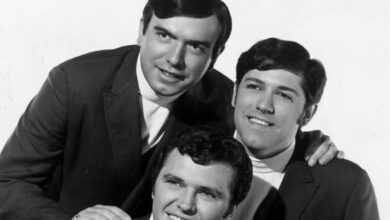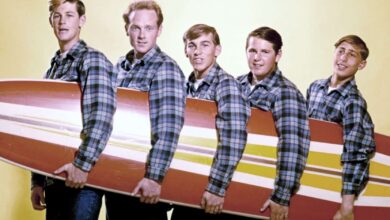The Bachelors’ “I Believe” Rekindles Spiritual Pop with Soaring Harmonies and Cross-Generational Appeal in 1964
In 1964, The Bachelors released their rendition of “I Believe,” a song that would become one of the most beloved and enduring entries in their catalog. At a time when British pop was racing forward with electric guitars and rebellious energy, the Irish vocal trio took a reflective pause and offered something deeply rooted in faith, sentiment, and elegance. Their version of “I Believe” soared to No. 2 on the UK Singles Chart, spending 24 weeks there and reaffirming the public’s enduring appetite for melody-rich, spiritually-tinged pop. More than just a chart success, the song was a quiet triumph of sincerity amid a fast-changing cultural moment.
Originally from Dublin, The Bachelors—brothers Con and Dec Cluskey, along with friend John Stokes—had already made waves in the early 1960s with their impeccable harmonies and clean-cut charm. Unlike many of their peers, they didn’t ride the coattails of rock ’n’ roll or R&B. Instead, they brought a revival of vocal group tradition, reminiscent of The Platters or The Four Aces, but with a uniquely Irish grace. It was their attention to vocal blend and a preference for romantic or spiritual material that made them a standout act in the British Invasion era.
“I Believe” was originally written in 1953 by Ervin Drake, Irvin Graham, Jimmy Shirl, and Al Stillman. Its first major hit came through Frankie Laine, whose dramatic baritone made it an anthem of hope during the Korean War. Over a decade later, The Bachelors reimagined it not as a power ballad, but as a delicate hymn—soaring yet intimate, grand in message but gentle in tone. They chose it not simply for its proven appeal, but because it aligned with the group’s core sensibilities: warmth, belief, and emotional honesty.
The song was produced by Michael Barclay, who had worked closely with the trio on earlier recordings. The production emphasized clarity and restraint, allowing the message of the lyrics to shine through the minimal but effective arrangement. With soft orchestration supporting them, the group’s trademark harmonies took center stage. Con handled the lead vocals with quiet authority, while Dec and John filled the remaining space with rich, unwavering support. It was a sonic structure rooted not in experimentation, but in the timelessness of good songwriting and vocal unity.
Upon its release, “I Believe” resonated deeply with audiences. While Beatlemania was exploding, this ballad of faith and conviction carved out a space for calm. The song reached No. 2 on the UK charts and remained there for months, even as louder, more modern sounds competed for attention. It became The Bachelors’ longest-charting single and one of their most requested numbers at live performances. In Ireland and the UK, it served as a kind of cultural salve—an affirmation during a period of social and generational change.
The success of “I Believe” carried a quiet cultural weight. It reminded the listening public that emotional vulnerability and spiritual conviction could still sell records in an age obsessed with rebellion and youth. For older listeners, the song was a balm; for younger ones, it may have represented the last breath of a musical innocence soon to be swept away by rock experimentation. The Bachelors bridged these divides with grace, proving that sincerity had not yet gone out of style.
Following the song’s success, The Bachelors’ profile rose sharply. They became staples on television variety shows across the UK and secured concert bookings in Europe, Australia, and North America. “I Believe” helped them shed any lingering associations with novelty or nostalgia, affirming them as artists of genuine emotional depth. It solidified their image as gentlemen of song—artists who offered not just entertainment, but comfort.
The impact of “I Believe” extended beyond the group’s career. It rejuvenated interest in spiritual pop ballads at a time when such songs were increasingly rare. Inspired by its success, other artists—including Elvis Presley and The Walker Brothers—would explore similar themes in the years to come, reaffirming that songs of hope and belief could still move hearts in the midst of cultural turbulence.
Though many have covered “I Believe,” including Mahalia Jackson, Barbra Streisand, and Tom Jones, few versions rival the pure vocal beauty of The Bachelors’ take. Their interpretation remains a gold standard in the genre, often cited in retrospectives and nostalgic compilations. It has been used in films, religious programming, and remembrance services—a testament to its enduring emotional reach.
In the context of 1964, the song’s release was particularly poignant. The world was on the cusp of seismic shifts—the Vietnam War escalating, civil rights movements rising, and popular music evolving into psychedelia. Against this backdrop, The Bachelors’ “I Believe” was a moment of pause, a gentle assertion that some values—faith, harmony, and love—remain eternal.
Over the decades, “I Believe” has remained one of The Bachelors’ most enduring legacies. It is still played on oldies radio and featured on classic ballad compilations, maintaining its power to move listeners across generations. In concert settings, it continues to elicit warm applause and emotional responses, especially among those who remember its original chart run.
The production style of the song—uncluttered, emotionally direct, and harmony-driven—would go on to influence the easy-listening genre of the late 1960s and early 1970s. Its success reaffirmed that not every hit needed to chase the trends of the day. Sometimes, the simplest sentiments, delivered sincerely, carry the greatest weight.
While The Bachelors would enjoy several more hits throughout the 1960s, including “Charmaine” and “Diane,” it is “I Believe” that remains their spiritual centerpiece. It captures the group’s essence better than any other: gentle, melodic, and quietly powerful. Even after the peak of their fame had passed, the song stood as a reminder of who they were and what they offered—a musical reassurance in a noisy world.
In the grand tapestry of 1960s music, “I Believe” is an outlier, and that’s precisely its strength. Where others chased revolution, The Bachelors turned inward, offering faith instead of fire, and harmony instead of upheaval. For those who heard it then—and for those who discover it now—it remains a soft but unshakable voice in the darkness, whispering something enduring: I believe for every drop of rain that falls, a flower grows.



